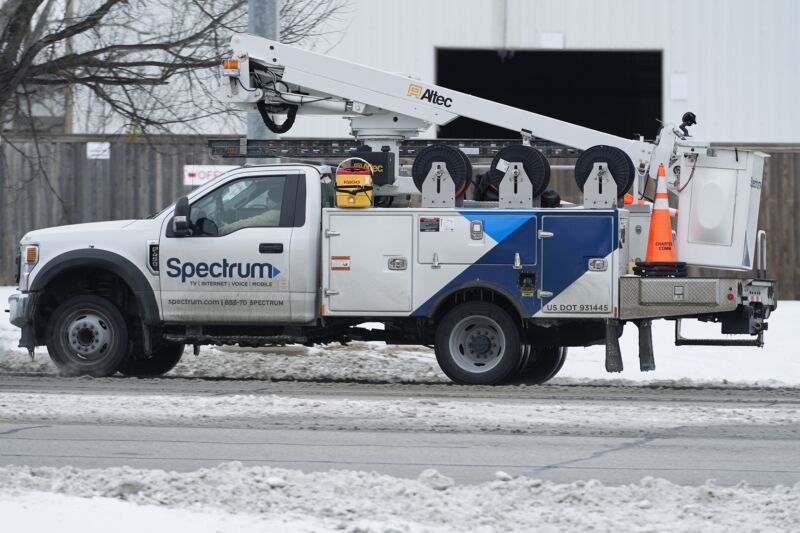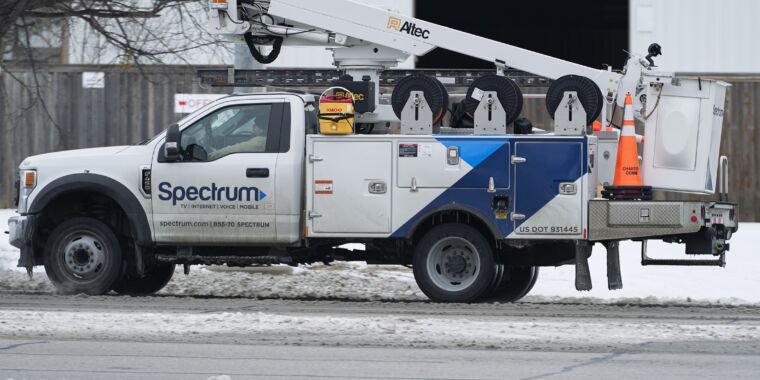
Getty Images | Bloomberg
Charter Communications must pay over $1.1 billion to the estate and family of an 83-year-old woman murdered in her home by a Spectrum cable technician, a Dallas County Court judge ruled yesterday.
A jury in the same court previously ordered Charter to pay $7 billion in punitive damages and $337.5 million in compensatory damages. Judge Juan Renteria lowered the award in a ruling issued yesterday.
The damages are split among the estate and four adult children of murder victim Betty Thomas. Renteria did not change the compensatory damages but lowered the punitive damages awarded to the family to $750 million. Pre-judgment interest on the damages pushes Charter’s total liability to over $1.1 billion.
It isn’t surprising that the judge lowered the payout, in which the jury decided punitive damages should be over 20 times higher than what Charter is liable for in compensatory damages. A nine-to-one ratio is often used as a maximum because of a 2003 US Supreme Court ruling that said: “In practice, few awards exceeding a single-digit ratio between punitive and compensatory damages, to a significant degree, will satisfy due process.”
Former Spectrum technician Roy Holden pleaded guilty to the 2019 murder of customer Betty Thomas and was sentenced to life in prison in April 2021. Charter was accused of hiring Holden without verifying his employment history and ignoring a series of red flags about his behavior, which included stealing credit cards and checks from elderly female customers. (More details on the murder are in our previous two articles on the topic.)
Jury: Charter guilty of “gross negligence” and forgery
Charter has already paid a portion of the judgment. “After the jury verdict, and before the entry of this Judgment, Plaintiffs have voluntarily remitted a substantial amount of the exemplary damages pursuant to Rule 315,” Renteria wrote.
Judge Renteria did not dispute the jury’s conclusion that Charter was guilty of “gross negligence” in the murder of Thomas. “The Court, after considering the evidence introduced at trial, the verdict of the jury, the voluntary remittitur of the Plaintiffs, the written and oral arguments of counsel, and the applicable law, is of the opinion that judgment should be entered in favor of the Plaintiffs,” Renteria wrote.
The jury also found that “Charter knowingly or intentionally committed forgery with the intent to defraud or harm Plaintiffs,” Renteria wrote. The family’s attorney previously said that “Charter Spectrum attorneys used a forged document to try to force the lawsuit into a closed-door arbitration where the results would have been secret and damages for the murder would have been limited to the amount of Ms. Thomas’s final bill.”
The compensatory damages totaled $375 million, with Charter responsible for $337.5 million and Holden for $37.5 million. Charter may end up having to pay that $37.5 million as well, though; the judge’s ruling said plaintiffs are entitled to the $37.5 million as “actual damages against either Roy James Holden or Charter Communications, LLC, jointly and severally.”
Charter still plans to appeal the ruling, a company spokesperson told Ars today. Charter previously said in a statement to Ars that the “crime was not foreseeable” and that Holden’s pre-employment criminal background check “showed no arrests, convictions, or other criminal behavior.” Charter also said Holden had “more than 1,000 completed service calls with zero customer complaints about his behavior.”
Disclosure: The Advance/Newhouse Partnership, which owns 12.4 percent of Charter, is part of Advance Publications. Advance Publications owns Condé Nast, which owns Ars Technica.








